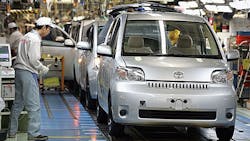Toyota Motor Corp. is sharpening its focus on keeping costs in check and fueling demand in China to prepare for challenges in a U.S. market potentially hit by a trade war.
The Japanese car giant reported first-quarter profit that topped analysts’ estimates, helped by expense reductions and rising sales in Asia. While keeping its full-year revenue and earnings forecast unchanged, the company slashed its prediction for North American sales by 50,000 vehicles.
Toyota joins other carmakers in preparing for challenges ahead as sedan sales cool in the U.S. and the country’s trade war with China threatens to boost prices and weigh on demand. The Japanese company reduced costs by 60 billion yen (US$540 million) in the first quarter and said it’ll continue to push for savings across its regions.
"We need to have a sharp focus on cost savings, even if it’s saving just one pencil," Senior Managing Officer Masayoshi Shirayanagi said at an earnings briefing Friday in Tokyo. "We’re still only halfway through our cost cutting efforts."
Shares of Toyota declined 0.9% to 7,220 yen in Tokyo. The stock is little changed this year.
The Trump administration’s steel and aluminum tariffs lowered Toyota’s full-year profit outlook by 10 billion yen, Shirayanagi said. Toyota hasn’t included the effect of any additional U.S. tariffs to its profit and vehicle sales outlook, but the impact would be very big, he said.
The U.S. has imposed new tariffs on goods from China, and the Commerce Department is probing whether imports of passenger vehicles imperil national security. If the U.S. levies a 25% tariff on cars and parts from abroad, the cost of an imported vehicle would go up by $6,000, Shirayanagi said. The cost of a locally produced Tundra would rise by $2,800, and a locally-made Sienna by $3,000, he said.
Last week, competitors including General Motors Co., Nissan Motor Co. and Daimler AG all described the risks they face under the tariff battle between U.S. President Donald Trump and his counterparts abroad. Hyundai Motor Co. reported earnings that missed estimates, saying that an extended trade dispute could weaken car demand and weigh on economic growth in China.
China Demand
Operating profit rose to 682.7 billion yen in the three months through June, Toyota said Friday. Analysts predicted 643.2 billion yen, the average of estimates compiled by Bloomberg. An increase in raw material costs hurt profit by 50 billion yen, the company said.
Sales growth was strongest in Asia, helped by demand in China. The carmaker delivered 13% more vehicles in the quarter in China compared with a year earlier, outpacing a 7% rise for the overall industry. It’s targeting sales of 1.4 million vehicles in 2018, up from 1.29 million last year. Shirayanagi said Toyota has a “very positive" view about achieving the goal.
Toyota recently altered its management structure, naming a Toyota City-based executive as head of Chinese operations instead of leaving decision-making to one in China. It also expanded capacity in China by 200,000 vehicles this year and can now make 1.16 million autos annually.
Sales in North America will probably be 2.75 million vehicles this fiscal year, less than the previous prediction of 2.8 million. Toyota boosted its Asia sales forecast by 20,000 vehicles to 1.69 million units.
Separately, Toyota said that it plans to sell its 5.89% stake in partner Isuzu Motors Ltd., ending a capital tie-up that’s lasted more than a decade. The companies will continue to cooperate.
By Kevin Buckland
About the Author
Bloomberg
Licensed content from Bloomberg, copyright 2016.
